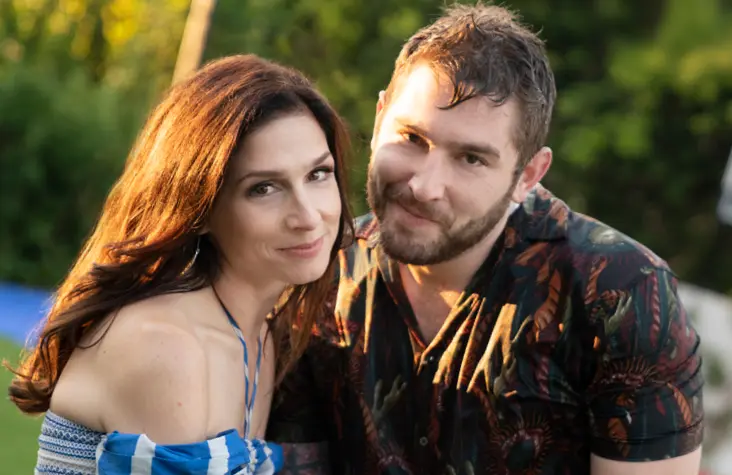Sundance's This Close is a Hidden Gem of Peak TV
-
 Shoshannah Stern and Joshua Feldman star as best friends Kate and Michael in Sundance's This Close (Photo: Michael Moriatis/SundanceNow)
Shoshannah Stern and Joshua Feldman star as best friends Kate and Michael in Sundance's This Close (Photo: Michael Moriatis/SundanceNow)Most of the television shows we talk about these days seem to exist in their own heightened reality, where the characters are tri-lingual assassins, or the setting is so stylized that the dinner plates match the heroine’s pumps. Like many viewers, I've come to love shows that call attention to their own construction, since that sophisticated artificiality is often a pathway to deep feeling. But sometimes it's nice to watch something more naturalistic that attempts to tell the story of essentially “real” people facing “real” issues. That’s why I like Shrill, Insecure and The Conners, and it’s why I especially like This Close, which is now streaming its second season on Sundance and AMC's streaming platforms.
One of the best examples of a great show that's flown under-the-radar in the Peak TV era, This Close explores the relationship between best friends Kate and Michael, played by series creators and writers Shoshannah Stern and Josh Feldman — actual best friends, both of whom (like the characters they play) are Deaf. They're joined by a supporting cast that has included Cheryl Hines, Marlee Matlin and Moshe Kantor.
So what makes This Close so special?
First, there’s the care that’s taken with the details of its central characters' lives. As they navigate their romantic and professional trials — not to mention the bumps in their own co-dependent friendship — Kate and Michael exist in a very particular world, and their experiences as Deaf people are embedded into every scene. This can result in pivotal dramatic moments, as when Michael gets his wrist strapped to a hospital gurney and is therefore unable to sign. We feel his panic at being rendered mute, and when Kate fumes at hospital staff who won’t help him, we realize this isn’t the first time they’ve felt abandoned by the medical establishment. Other elements sail by without comment, like the flashing light that Kate uses in lieu of a doorbell, or the easy way that Michael’s husband Ryan (Colt Prattes) taps him to get his attention when he comes up behind him. These touches are important because they pass without remark, signaling the fact that the show exists in a fully realized environment, and trusts us to understand its contours.
But it’s not just the show’s Deaf elements that are thoughtfully realized. When Kate goes home to Georgia, for instance, her family actually speaks with authentic Georgia accents and not the generic Southern twang that so often passes for regional accuracy. When Michael and Ryan go out for a nice dinner, they wear the brightly colored, well-cut suits that you’d expect, and when we flash back to Michael and Kate’s early years in LA, Michael’s waxed chest is exactly right for a young-ish man trying to mimic the gay style of the early aughts.
Because we can believe in the show’s mise-en-scène, we can also believe in its emotional stakes. And that leads me to the other thing that makes This Close resonate: Everyone’s problems emerge slowly — not with the melodramatic speed of a nighttime soap — and they linger over weeks instead of getting resolved in a tidy 30 minutes.
The most obvious example is Michael’s substance abuse problem, which hits peaks and valleys over the 14 episodes of the first two seasons, but always colors his relationships. Meanwhile, Kate gradually and gratifyingly realizes that her own fear of being loved is as much to blame for her constant heartache as the deficiencies of her boyfriends. But the show's most affecting slow burn is between Michael and Kate themselves. As close as they are, they’re not always good for each other, and the second season ends with some well-earned drama over how they’re going to move forward.
The characters in This Close are so relatable, so wonderfully ordinary, that I've found myself worrying about them in my free time and have specific hopes for their futures. At this point Kate and Michael feel like my friends, and I want to keep watching what happens to them, just so I can be sure that they’re okay. I could never have that type of connection with Midge Maisel or Killing Eve's Villanelle, no matter how much I enjoy them. When it comes to naturalistic TV, that’s exactly the kind of entanglement I look for, and one of the many reasons This Close is worth celebrating.
Are you watching This Close? Share your thoughts in on our forums.
Mark Blankenship has been writing about arts and culture for twenty years, with bylines in The New York Times, Variety, Vulture, Fortune, and many others. You can hear him on the pop music podcast Mark and Sarah Talk About Songs.
TOPICS: Sundance Now, This Close, Cheryl Hines, Joshua Feldman, Marlee Matlin, Moshe Kasher, Shoshannah Stern
- Sundance Now's Ten Percent is a pointless remake of French Netflix hit Call My Agent!
- Ten Percent, the British adaptation of Call My Agent!, unveils its trailer
- Call My Agent!'s British remake reveals its big-name guest-stars, from Kelly Macdonald to Helena Bonham Carter
- A Discovery of Witches sets its third and final season premiere date